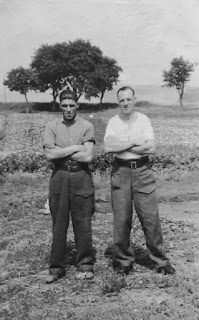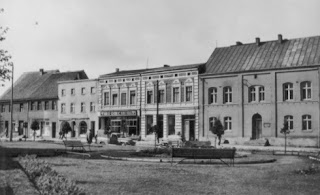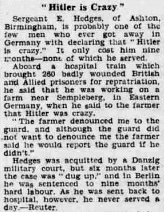John Edward Hedges 1906-1986:
‘Uncle Eddie’…
 |
| Eddie, left. Thanks to my cousin John Hedges for sending me this photo! |
I guess this guy was rather an outcast, largely shunned by his siblings and indeed, is missing from the family photographs I have of the Hedges family.
Little is known about his early life, apart from one incident in 1936 when he was playing football in Ward End Park, Birmingham. At 30, he was mature enough to respond to a request to return home from one of his sisters (Ghreta, I believe) because his father lay on his death bed. Eddie chose to finish his game of soccer first…
At that point in his life, he was a professional soldier, number 7879488, a Private with the Seaforth Highlanders, having attested as a labourer with the Royal Tank Corps on 19th October 1927 and then transferring to the Scottish Regiment nearly a year later, on 19th September 1928. A strange move indeed for a couple of reasons. Firstly, he was only in the Royal Tank Corps for 11 months and secondly, my mum told me that despite the fact that he loved his football, he would never show his knees, so, er, he joined the Seaforth Highlanders…
He had been born at The Curragh Barracks in Kildare, Ireland, on the 11th February 1906, when his father Grandad Hedges had been stationed there. There is then a gap of some 21 years, although when the 1921 census is revealed in January 2022, his occupation should be written on the list, for the years prior to his military career.
 |
| THE CURRAGH CAMP... |
However, typical of the Hedges family, it was his military career which proved rather interesting. My mum told me that he was such a fine left-hand batsman that he played regimental cricket in the army, the only Private to be included in the team, apparently. Unfortunately though, when Dunkirk happened, his fitness was permanently damaged, after he was taken prisoner by the Germans when the 2nd Battalion of Seaforths was engaged in protecting the allied retreat from the beaches.
 |
| EDDIE, RIGHT, IN CAPTIVITY. THANKS TO COUSIN DEREK EASTWOOD FOR SENDING ME THIS POSTCARD... |
 |
| THE FLIP-SIDE OF THE POSTCARD... |
Thus, during the 1940-44 period Eddie was held as a prisoner of war and thanks to a postcard sent to his mother, posted on 21st December 1942, it seems that he was detained at that time at Stalag XX-A, which was in Toruń, Poland, where 4,500 captured British soldiers were held, following Dunkirk. A photograph of Eddie and a mate appears on the front of the postcard.
 |
| STALAG XX-A, TORUŃ, POLAND... |
The city was surrounded by 15 forts, built late in the 19th century to protect the western border of Prussia and those forts became the prisoners’ camp.
The next story about Eddie, described as a Sergeant, is remarkable and remains one which could be described as incredible. He was working on a farm near Zempelburg in northern Poland and told the farmer that he thought that Hitler was crazy but the farmer denounced Eddie to a guard. The guard didn’t appear to be too bothered about this until the farmer threatened to report the guard and subsequently Eddie was in some trouble.
 |
| ZEMPELBURG... |
My mum told me that Eddie, who looked fairly fit on the 1942 postcard, had been wounded and it appears that the incident might have happened at this point in his confinement, although it could also have taken place in 1940, then deteriorated.
The fact was that whilst being marched along a road, a woman held out either water or bread to the prisoners and Eddie reached for her offering, which resulted in a German soldier striking him across a leg with the butt of his rifle. The injury was never treated properly and Eddie’s sport playing days were over.
A military court in Gdańsk (Danzig) acquitted Eddie of the charge but some 6 months later his case resurfaced and he was tried in Berlin, being sentenced to 9 months of hard labour, which he never served and he was sent back to hospital. It does appear therefore, that the leg injury must have been so painful by this time, that in 1944 he was repatriated.
 |
| GDAŃSK (DANZIG), POLAND... |
He was part of a prisoner exchange at Gothenburg, where three ships, the Swedish liners Drottningholm and Gripsholm, plus the British steamer Arundel Castle transported 2635 prisoners of war and civilian internees to Liverpool. (2300 German prisoners were exchanged in return…)
 |
| THE DROTTNINGHOLM, IN WHITE LIVERY, PAINTED IN THE LATE 1930S... |
 |
| THE GRIPSHOLM... |
 |
| THE ARUNDEL CASTLE... |
Reuters reported Eddie’s case and newspapers The Scotsman and the Yorkshire Post & Leeds Mercury picked up the story, mentioning it in their issues of 11th September 1944.
 |
| THE YORKSHIRE POST & LEEDS MERCURY, 11-09-1944... |
 |
| THE SCOTSMAN, 11-09-1944... |
Eddie was handicapped by his leg injury and hobbled with a walking stick for the remainder of his life. He became quite well known around the Perry Common area for his speedy limping along College Road, from his prefabricated home.
My memories of him are few but I do recall a couple of visits made to 63 Bamville Road and in Nearmoor Road, Shard End and he gave me a couple of football programmes, one of which was one for the Chelsea v Aston Villa game in 1959-60. Eddie had written the changes to the teams on the back page with a blue fountain pen, a practice I performed with a felt-tip for years on programmes from matches I had seen. I no longer have the original Chelsea programme but I have managed to secure another copy, to remember Eddie by…
I understand that Eddie watched Villa home and away through the late 1940s, the 1950s and presumably into the 1960s, keeping everything, from programmes to Sports Argus newspapers and other soccer memorabilia. He travelled on the team bus with the players to away matches, I’m told because the club sympathised with his war wound and I guess he lived on a war pension of some kind. It was rare for away fans to travel away in those days, due to work commitments on Saturday mornings for many folks. There were no evening matches in the winter months either, because there was no floodlighting of course. I believe some games were played on Wednesday afternoons however…
During the summer months, I believe he watched Warwickshire’s cricket team play, home and away whenever possible.
Clearly, the guy was obsessed with the two sports, which he had so cruelly been prevented from taking part in by a German guard’s bludgeoning rifle butt. In 1939 Eddie was living at 20 Elmore Road, Yardley, with a wife, Ivy but when he moved to Perry Common I have no idea. He had no children but my father recalled Eddie turning up on a Christmas Day unannounced, when the family was together enjoying festivities and he stopped the party by deciding to kip down on the floor in front of the fire, forcing everyone else to return to bed…
This man was disliked by his siblings, who complained bitterly of his ignorance and the passion with which he followed his sport. When he died, his brother Fred (Bun) cleared his prefab’ out and chucked away a huge number of historic, valuable sports programmes and press cuttings. If only I had known at the time…
Many thanks once again to Jan Pick for her invaluable help in putting this together!
I wrote the poem featured below in 2008 about ‘Eddie The Outcast’ and I feel that it is important to include it in my tribute to him…
Eddie The Outcast…
The outcast, the family refugee,
The solitary, the loner;
The cripple, the damned,
The dark sheep, the inimitable Uncle Eddie…
Born to sport, left-handed,
Obsessed.
Youth spent in Ward End Park,
Dawn until dark;
Impressed
With clever footwork and smart batting technique
But life is more than just a lark…
Into military service,
Drafted;
A Highland Division, uniform smart,
Cricketing prowess stood him apart;
Crafted
A batting position, though a mere Private,
With the summer game ingrained in his heart.
Prisoner of war, marching,
Offered
Water by a French woman, didn’t beg…
Rifle-butt cracked against his leg;
Suffered
The excruciating pain,
Maimed for life, humanity’s dreg.
“Hitler’s crazy!” he was heard to exclaim,
Publicly;
Reuters would report the bravely uttered phrase,
Cruelly disabled for his remaining days,
Tragically;
Active sport no longer an option,
Precipitating his compulsive watching phase.
A recognisable local figure, with walking-stick,
Stumbling
At speed from pre-fabricated house;
Married, despite his habit to grouse,
Grumbling
No doubt, about ‘The Villa’,
To a patient, long-suffering, insignificant spouse.
Travelled with the team across the land;
Sympathy.
Rarely, if ever, missed a game,
This lopsided invalid with only life to blame;
Apathy
Regarding family life;
The avid competitor, now extraordinarily lame.
I remember him hobbling into my front room,
Muttering
About Saturday’s match, clutching a Chelsea programme, blue,
Team-changes, curious in fountain pen’s scrawled indigo hue;
Stuttering,
Embarrassed, almost, to be there.
One memory of him, fading, among precious few.
The most famous story I recall about Eddie,
Mithering:
Turned up at his mother’s house on Christmas Day
And despite a family party being in full sway,
Dithering,
He settled himself before the fire,
To sleep on the sofa and indignantly lay…
The bizarre, the utterly heady,
The oddball, the waif;
The disabled, the cursed,
The near-hermit, the intriguing Uncle Eddie…
Pete Ray
Written in April 2008, then amended in February 2021…






No comments:
Post a Comment